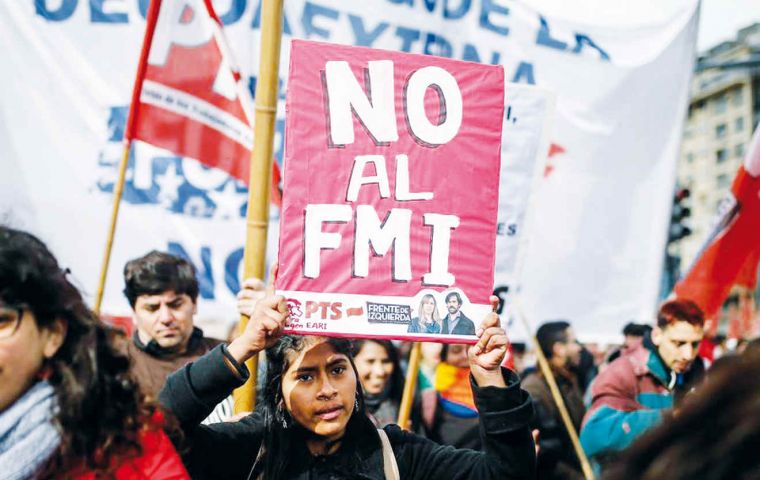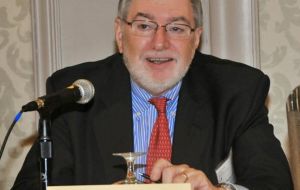MercoPress. South Atlantic News Agency
Questions on the role of the IMF in the Argentine financial situation
 Argentina has one of the highest inflation rates in the world, 55%, unemployment has risen to 10.1% this year and a third of the population lives in poverty.
Argentina has one of the highest inflation rates in the world, 55%, unemployment has risen to 10.1% this year and a third of the population lives in poverty.  Claudio Loser, an Argentine economist who served as the head of IMF's Western Hemisphere department from 1994 to 2002, played down the fund's responsibility
Claudio Loser, an Argentine economist who served as the head of IMF's Western Hemisphere department from 1994 to 2002, played down the fund's responsibility  “Everyone involved really, really should have known better” Nobel Prize economist Paul Krugman said on Twitter in a thread he titled “Crying for Argentina.”
“Everyone involved really, really should have known better” Nobel Prize economist Paul Krugman said on Twitter in a thread he titled “Crying for Argentina.” Despite a history of many IMF rescue programs, Argentina once again faces a deepening financial crisis, raising questions about whether the Washington-based lender made a mistake in its dealings with Latin America's third largest economy.
The International Monetary Fund, which last year approved a record US$57 billion loan for Argentina in exchange for sweeping economic reforms, is in the eye of the storm after President Mauricio Macri suffered a crushing defeat in the Aug 11 primary elections.
The victory of Peronist candidate Alberto Fernandez put Macri's re-election in serious jeopardy, and threw financial markets into turmoil, worsening the already grim economic outlook.
Macri requested a loan from the IMF in April 2018 after a run on the currency weakened the peso and worsened the ongoing financial downturn.
Despite early signs the reforms he implemented were stabilizing the economy - and amid the optimistic analysis from the IMF - prices soared and job losses accelerated, sparking outrage and protests in a country with a long, fraught history with the fund.
Argentina has one of the highest inflation rates in the world at 55%, while unemployment has raised to 10.1% this year and a third of the population lives in poverty.
“Everyone involved really, really should have known better,” Nobel Prize-winning economist Paul Krugman said on Twitter in a thread he titled “Crying for Argentina.”
He accused Macri of shying away from necessary steps for fear of the political blowback, saying he was “unwilling to take the heat for large budget cuts.”
Macri's reluctance may have been understandable, given the antagonism towards the IMF and its austerity requirements, even though the fund this time has insisted on protecting spending for social programs.
“Macri either couldn't or wouldn't bite the bullet,” Krugman tweeted, deploring the increase in foreign debt.
Official data show the external debt, largely denominated in US dollars, rose to 88.5% of GDP in 2019 from 52.6% in 2015.
Krugman also questioned the IMF's continued willingness to provide financing in the country's repeated economic crises.
“What's striking ... is that this is incredibly close to the script from 1998-2001,” Krugman tweeted. The current episode features “similar policy mistakes, and similar enabling of those mistakes by the IMF.”
Other experts were less surprised by the IMF's actions.
“The decision to grant Argentina a loan of this size was much more political than technical. The fund is like that; it's always been like that,” economist Monica de Bolle said.
Macri's “incremental” strategy involved “a lot of risk,” which the IMF recognized, said de Bolle, who worked as an economist for the lender during Argentina's 2002 crisis.
“The IMF's image suffered from this excess of optimism,” said the economist, now a researcher at the Peterson Institute for International Economics in Washington.
Jayati Ghosh, an economics professor at Jawaharlal Nehru University in New Delhi, agreed that the fund has “a long history of policy mistakes.”
But Claudio Loser, an Argentine economist who served as the head of IMF's Western Hemisphere department from 1994 to 2002, played down the fund's responsibility for the country's failings.
He blamed Macri for policy mistakes, particularly at the start of his term, saying he should have reached out to the IMF at the end of 2017 instead of waiting until last year.
However Loser said that while the IMF was “clearly not” responsible for the latest crisis, it had loaned Argentina too much because “the management of the IMF wanted to have a big success.”
“Unfortunately, the Argentines more than the IMF failed because they never accept the idea that adjustment is inevitable and takes time,” and the country's political opposition and trade unions are “skilled at destabilizing governments.”
Benjamin Gedan, the director of the Wilson Centre's Argentina project, said that “some of Macri's errors were foreseeable, such as borrowing so massively, and in dollars.”
But the “deeper and quicker” budget cuts that some called for could have provoked a political crisis.
“The IMF seems to have overlooked doubts about Argentina's debt repayment capacity because key board members, including the United States, had fallen head over heels for Macri,” he said.
Macri, who came to power after promising to change the protectionist policies of his predecessor Cristina Kirchner (2007-2015), won over US President Donald Trump's representative in the institution, as well as IMF chief Christine Lagarde herself.
Lagarde, who leaves the IMF this week to take over leadership of the European Central Bank later this year, admitted in June that the fund had “underestimated” the severity of Argentina's “incredibly complicated” economic challenge.




Top Comments
Disclaimer & comment rules-

Read all commentsThe IMF's decision-makers will have to assume their share of responsibility for the fiasco. They provided the largest loan to a country that was clearly badly managed. As several quoted in the above story said, it was foolish to expect a change in direction that would have counteracted the IMF's recessive recipes.
Sep 14th, 2019 - 04:24 am -1Donald Trump, however, wanted to keep a friendly power in Argentina, which added to Brazil tipped the balance of power into the hands of backward presidents.
Sorry, Donald. Better luck next time.
Commenting for this story is now closed.
If you have a Facebook account, become a fan and comment on our Facebook Page!